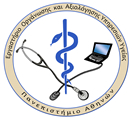Symptoms
 1. Fever 38oC or higher 1. Fever 38oC or higher
|
| |
 2. Hoarseness of voice 2. Hoarseness of voice
|
| |
 3. Sore throat with difficulty or pain during swallowing 3. Sore throat with difficulty or pain during swallowing
|
| |
 4. Headache 4. Headache
|
| |
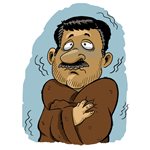 5. Chills 5. Chills
|
| |
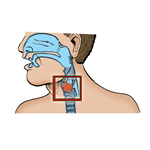 6. A thick membrane covering your throat (pharynx) and tonsils and/or nose which renders breathing difficult 6. A thick membrane covering your throat (pharynx) and tonsils and/or nose which renders breathing difficult
|
| |
 7. Cough 7. Cough
|
| |
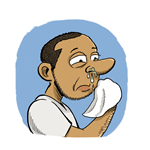 8. Nasal discharge 8. Nasal discharge
|
| |
 9. Swollen glands in your neck 9. Swollen glands in your neck
|
Transmission
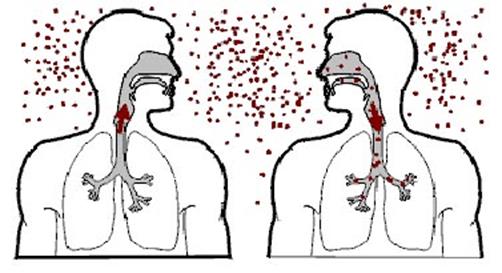
Diphtheria spreads easily from one person to another. A patient's sneeze or cough releases a mist of contaminated droplets that may enter another person's body by the mouth or nose, therefore it is very easy for a person to get infected following prolonged contact with someone who has the condition, e.g. a room-mate. More rarely the disease may be transmitted by contaminated objects such as glasses, forks, spoons and handkerchiefs, as well as after coming into close contact with cattle because they carry the bacteria in their nose and throat. Finally, a person could be infected from drinking unpasteurized milk or eating food made with unpasteurized milk. In countries with poor hygiene conditions, one may be infected with cutaneous diphtheria that spreads by contact with a contaminated wound. In such case, you may develop pus-filled spots on your skin which, once broken, form ulcers.
Treatment
For the treatment of diphtheria seek medical assistance. If diphtheria is suspected, you will be immediately referred to a hospital. Diphtheria is treated with antibiotics. You should have the diphtheria vaccination after you have been treated, because having the diphtheria doesn't always prevent you getting the infection again.
Cutaneous diphtheria is treated by thoroughly washing any wounds infected with the diphtheria bacteria with soap and water. The ulcers (wounds) usually heal within 2-3 months.
Preventing diphtheria
The most effective way of preventing diphtheria is vaccination.
When to seek medical advice
Call your doctor immediately if you have any of the above symptoms or have being exposed to someone with diphtheria.
Vaccines
The vaccine against Diphtheria-Tetanus-Pertussis (DTaP) is available in Greece in combination with other vaccines. According to the National Immunization Program, all infants should have their primary immunization starting at the age of 6 weeks and receiving 6 doses up to the age of 11-12 years. Subsequently, booster doses of Td should be given every 10 years throughout a person's life.
It is recommended that all adults who are not fully immunized, or if their immunization history is unclear, irrespective of age, should be administered 3 doses of the Td vaccine. The vaccine is completed with a booster Td dose every ten-years.
References
keelpno
nhs.uk
cdc
National Immunization Program for Children and Adolescents 2011
















